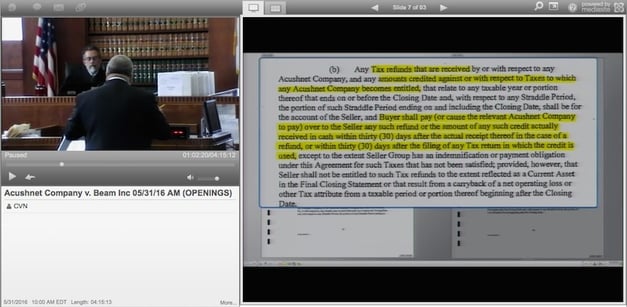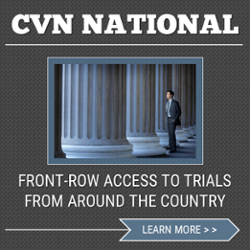
Attorney Eric Breslin reviews the stock purchase agreement governing Acushnet's $1.2 billion sale to Fila during his opening statement. Click here to see video from the trial.
Boston - Golf and booze usually go well together, but on Tuesday in a Massachusetts state courtroom golf equipment seller Acushnet Co., and spirits company Beam Suntory Inc. squared off at a trial over $16.6 million that Acushnet claims it is owed after its $1.2 billion sale to Fila Korea LTD by Beam’s former holding company Fortune Brands.
At issue in the case is the definition under the sale’s stock purchase agreement of Acushnet’s value-added tax receivables, or VATs, that Acushnet takes in from the sale of its products abroad. Acushnet and Beam were both formerly subsidiaries of Fortune, until the company sold Acushnet to Fila in 2011 and continued operating under the Beam name.
Acushnet sells the popular Titleist-brand golf clubs, balls and tees and Footjoy-brand golf shoes. Fortune sold the golf company in 2011 to focus on its liquor business, which includes Jim Beam and Maker’s Mark bourbon and Courvoisier cognac brands. In 2014 Beam was purchased by Japan-based Suntory Holdings for $13.6 billion.
Under the SPA, Beam agreed to cover a tax liability owed by Acushnet that both sides agreed totaled $19.3 million. Acushnet claims Beam only paid $2.7 million and then said the remaining $16.6 million was covered by the revenue from Acushnet’s VAT receivables. Under the SPA Beam is entitled to certain tax credits and refunds enjoyed by Acushnet, and Beam determined the revenue from VAT receivables was a type of tax credit to which they were entitled.
Acushnet argues that Beam’s “unilateral” decision to offset its tax liability with VAT revenue breaches the SPA, and that VAT receivables can’t be considered credits or refunds because they represent amounts invoiced to Acushnet’s customers, not amounts due from a government authority.
“They helped themselves to money based on an internal account that they saw on the books. but that they did not understand or that they did not care to understand,” Acushnet’s attorney Eric Breslin of Duane Morris LLP said during his opening statement, according to a Courtroom View Network webcast of the trial.
Breslin explained that because of the extremely seasonal nature of Acushnet's business, that Beam's decision left the company in a substantial cash crunch. As a result, Breslin argued they had to take on a number of loans to keep Acushnet afloat until the next busy season for golf sales.
Acushnet seeks a declaratory judgment that Beam breached the SPA, and damages in addition to the $16.6 million to be determined during the trial, Breslin said.
Beam’s attorney Michael Tuteur of Foley & Lardner LLP argued during his opening statement that Beam’s decision was consistent with the understanding reached by the parties when drafting the SPA.
“The value-added tax receivables rightfully belong to Beam,” he said. “They most certainly do not belong to Acushnet.”
As most of the evidence and testimony in the trial hinges on the esoteric nomenclature used at the intersection of mergers & acquisitions and accounting law, the parties agreed to try the case without a jury. Judge Kenneth Salinger, who sits in a special section of the Suffolk County Superior Court dedicated to resolving complex business disputes, is expected to hear up to two-weeks of testimony, and the trial will be webcast gavel-to-gavel by Courtroom View Network.
Representatives for Acushnet and Beam did not respond to requests for comment.
The case is Acushnet Co. v. Beam Inc., case number 1284CV01193 in the Superior Court of Suffolk County.
E-mail David Siegel at dsiegel@cvn.com





